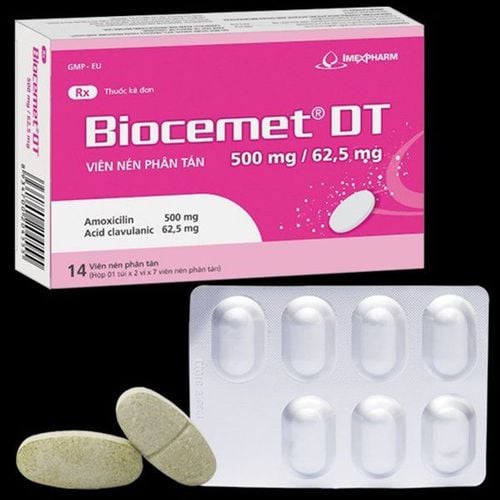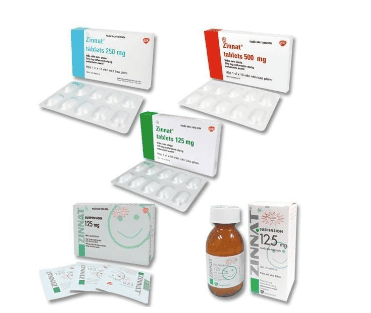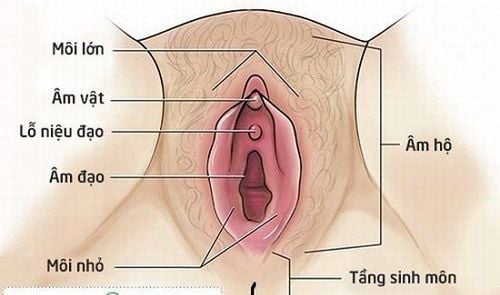This is an automatically translated article.
Medozopen 1g drug belongs to the group of anti-parasitic, anti-infective, anti-viral, anti-fungal drugs, so it is prescribed by doctors to treat a number of infectious diseases. The following is information about the uses, dosage and precautions when using Medozopen 1g.
1. What are the uses of Medozopen 1g?
Medozopen 1g is made in powder form for injection and packaged in a box of 1 vial. The composition of the drug is Meropenem, in the form of Meropenem trihydrate 1g.
Meropenem is administered intravenously (IV) and is indicated in the treatment of infections in adults and children caused by one or more susceptible organisms to meropenem such as:
Pneumonia and nosocomial pneumonia; Have a urinary tract infection; Intra-abdominal infection; Having gynecological infections such as endometritis and pelvic inflammatory diseases; Infections on the skin and in the skin structure; Meningitis ; Have a bacteremia ; Empiric treatment for suspected bacterial infection in adults such as febrile neutropenia as monotherapy or in combination with antiviral or antifungal agents.
Meropenem as monotherapy or in combination with other antibacterial agents has been shown to be effective in the treatment of mixed infections. There is no experience with its use in children with leukopenia or primary or secondary immunodeficiency.
2. Dosage and how to use Medozopen 1g
2.1 Dosage For adults: Dosage and duration of treatment depend on the severity and type of infection as well as the medical condition of each patient.
The recommended daily dose is as follows:
500mg Meropenem intravenously (IV) every 8 hours in the treatment of pneumonia, urinary tract infections, gynecological infections such as endometritis, skin infections and in the skin structure; Administer 1g of Meropenem intravenously (IV) every 8 hours in the treatment of nosocomial pneumonia, peritonitis, suspected bacterial infection in patients with leukopenia, sepsis; For patients with cystic fibrosis, doses up to 2g every 8 hours have been used; the majority of patients were treated with a dose of 2g every 8 hours; For patients with meningitis, the recommended dose is 2g every 8 hours. As with other antibiotics, special caution should be exercised when meropenem is used as monotherapy in patients with suspected serious bacterial or Pseudomonas aeruginosa infections of the lower respiratory tract.
During the use of Medozopen 1g, it is recommended to regularly test the sensitivity of the drug when treating infections caused by Pseudomonas aeruginosa.
For adult patients with impaired renal function
For patients with impaired renal function with creatinine clearance <51ml/min, the dose should be reduced according to the following guidelines:
26-50ml/min: Dosage in dose units 500mg, 1g, 2g is a dose unit every 12 hours; 10-25ml/min: Dosage in dose units 500mg, 1g, 2g is half a dose unit every 12 hours; <10ml/min: Dosage in 500mg, 1g, and 2g dose units is half a dose every 24 hours. Meropenem is eliminated by hemodialysis; If continued treatment with Meropenem is required, after completion of hemodialysis, a single dose unit (depending on the type and severity of infection) is recommended to ensure effective therapeutic plasma concentrations.
For patients undergoing peritoneal dialysis there is no experience with 'Meronem'.
For patients with hepatic impairment
For this patient population, no dose adjustment is required.
For elderly patients
If elderly patients have normal renal function or creatinine clearance >50ml/min, no dose adjustment is required.
For children:
Children from 3 months to 12 years: The recommended dose is 10-20 mg/kg every 8 hours depending on the severity and type of infection, susceptibility of the pathogen and the condition of the patient. the child's medical condition; Children weighing over 50kg: The recommended dose is the same as that used in adults; Children with meningitis: The recommended dose is 40 mg/kg every 8 hours; Children with renal impairment: There is no experience in this group of children. 2.2 Dosage With the available formulations of Meropenem IV, it can be administered intravenously over approximately 5 minutes or intravenously over 15-30 minutes.
Meropenem IV for intravenous administration should be mixed with sterile water for injection (5 ml per 250 mg of meropenem) to give a solution concentration of approximately 50 mg/ml. The solution after reconstitution is clear, colorless or pale yellow.
3. Notes when using Medozopen 1g
3.1.Contraindications Do not use Meropenem for patients with hypersensitivity to any of the ingredients of the drug.
3.2.Side effects After injection may occur reactions at the injection site such as inflammation, thrombophlebitis, pain at the injection site; After injection, systemic allergic reactions such as systemic allergic reactions (hypersensitivity) may also occur, but are rare with the use of meropenem. These reactions include angioedema and anaphylactic manifestations; Side effects manifest on the skin: rash, itching, urticaria. Serious skin reactions such as erythema multiforme, Stevens-Johnson syndrome and toxic skin necrosis have been reported rarely; Gastrointestinal disturbances may occur: abdominal pain, nausea and vomiting, diarrhea. There has been a case of pseudomembranous colitis; Blood tests: Phenomenons such as thrombocytopenia, eosinophilia, thrombocytopenia, leukopenia, and neutropenia (including agranulocytosis very rarely) may occur and may be present. recovery ability. Rarely, hemolytic anemia occurs. Some patients may experience a direct or indirect positive coombs reaction. There have been documented cases of decreased partial thromboplastin time. Hepatic dysfunction: Increases in serum bilirubin, transaminases, alkaline phosphatase and lactic dehydrogenase have been reported alone or in combination; Central nervous system affected: Headache, paresthesia. There have been reports of seizures although a link with Meropenem has not been established; Some other undesirable effects are oral and vaginal candidiasis. Medozopen 1g drug belongs to the group of anti-parasitic, anti-infective, anti-viral, anti-fungal drugs, so it is prescribed by doctors to treat a number of infectious diseases. To ensure the effectiveness of treatment and avoid unwanted side effects, patients need to strictly follow the instructions of the doctor, professional pharmacist.
Follow Vinmec International General Hospital website to get more health, nutrition and beauty information to protect the health of yourself and your loved ones in your family.
Please dial HOTLINE for more information or register for an appointment HERE. Download MyVinmec app to make appointments faster and to manage your bookings easily.













